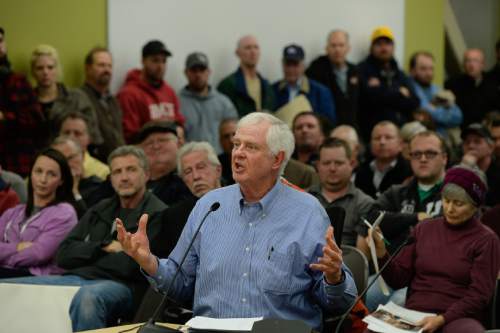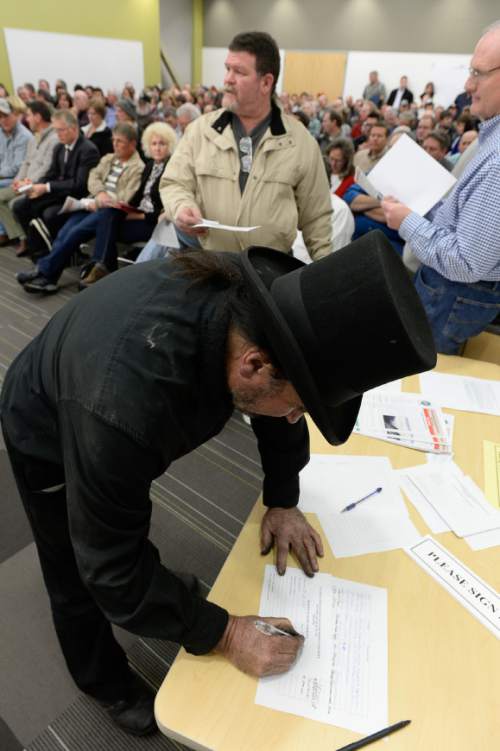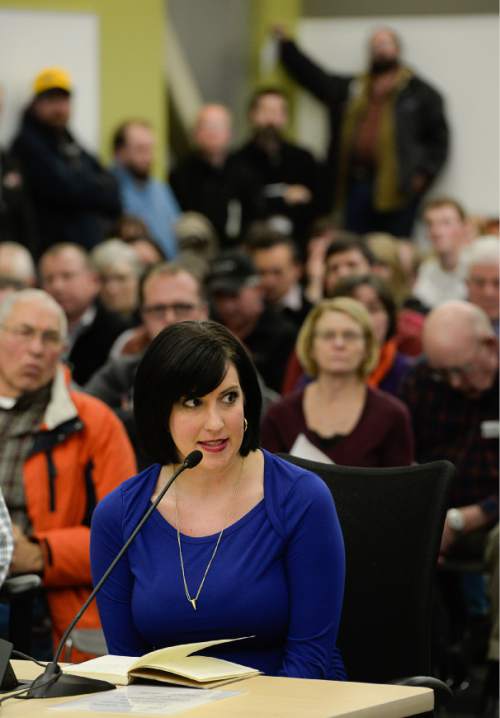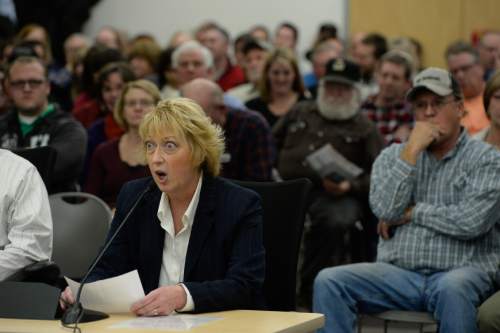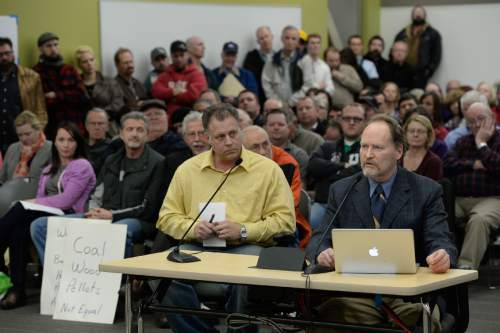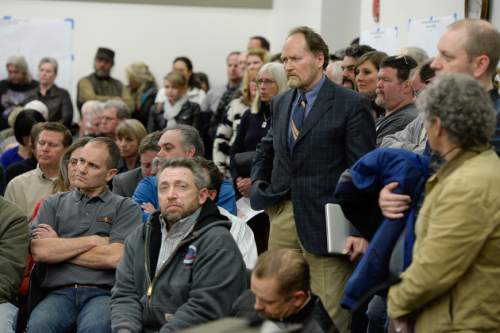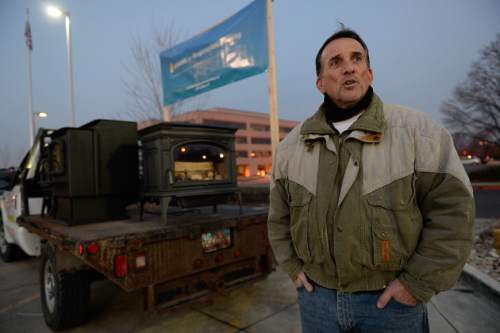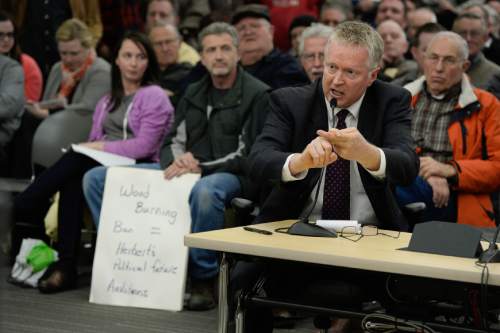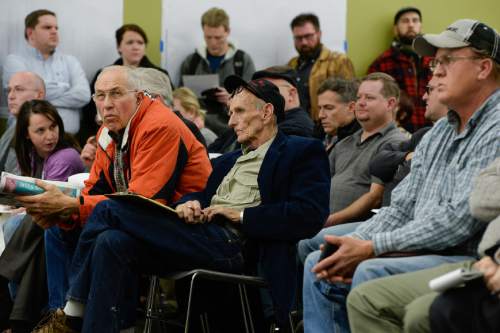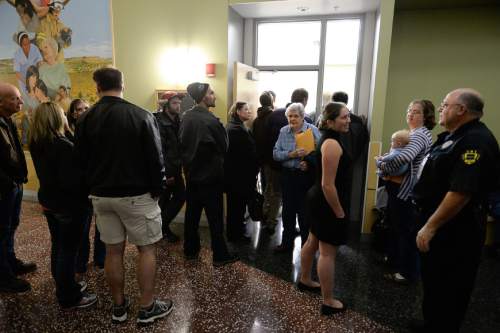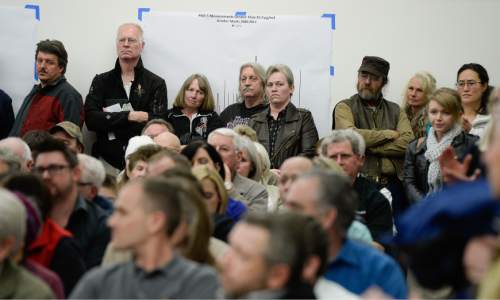This is an archived article that was published on sltrib.com in 2015, and information in the article may be outdated. It is provided only for personal research purposes and may not be reprinted.
Utah Gov. Gary Herbert's proposed ban on wintertime wood burning faced searing criticism at a Thursday night hearing where most speakers argued such a move would erode personal freedom while offering few public health or environmental benefits.
Eileen Bagley, who has a heart condition that makes her feel cold easily, has depended on wood heat for 36 years to keep her comfortable.
"I can't live without it. I'm talking pure survival," Bagley told the Utah Air Quality Board in a Salt Lake City meeting room packed with 300 citizens. "With wood, everything is warm. Your couch is warm, your countertops are warm. But on the red days when you heat with forced air, everything is cold. The air is warm, but everything else is cold. I have to wear three sweaters."
Bagley and other critics see the ban as a slippery slope that could lead to further restrictions aimed at advancing hidden agendas at the expense of liberty.
"When will it end? In a republic, even a minority of one has the right to live how they choose," she said as the room broke into applause.
Bagley's has been the the dominant view voiced this week at hearings and written comments to the Air Quality Board as it considers toughening burn restrictions. The Utah Department of Environmental Quality wants to prohibit nearly all wood burning during winter along the Wasatch Front, which endures intense concentrations of fine particulate pollution during periodic inversions.
New research indicates wood smoke contributes to the mostly vehicle-caused pollution that pools in the valleys — despite longstanding burn restrictions during inversions.
According to the Division of Air Quality, wood smoke particles turn up on Salt Lake City's air quality monitoring filters on days when people shouldn't be burning.
"Clearly what we have been doing hasn't been effective enough at addressing this one portion. About 5 percent of the total particulate can be attributed directly to wood smoke," DAQ director Bryce Bird said. "But wood is also a large source of the pollutants that form secondary particles, and there are also a number of hazardous air pollutants as well."
But Jeanne Dayton of Pleasant Grove wondered why, if her family's burning is just 5 percent of the air pollution problem, they should be required to forgo all the benefits of wood heat.
"It is wrong to take away our rights to care for our family's basic needs," Dayton said. "I am asked to give up 100 percent of everything I have worked for my entire life to be self-reliant and independent. In return, I'm guaranteed nothing. Is this justice? Is it fair to target one group of people?"
Wood burning already is restricted along the Wasatch Front and in Cache Valley, a region that is out of attainment for the federal standard for fine particulate matter, or PM 2.5. Burning is restricted in the state's population centers as inversions build and persist, even during days with moderate or "yellow" pollution levels under Utah's color-coded air quality alert system.
This week, for example, burning has been prohibited, even though PM2.5 pollution has remained below the federal threshold of 35 micrograms per cubic meter. State scientists says a full burn ban could knock nearly 2 micrograms off the Salt Lake Valley's worst PM 2.5 readings — about a 4 percent reduction.
The ban proposal's few supporters responded that no one should have the right to unnecessarily degrade the air.
"Someone's right to use a wood stove should not surpass my right to have clean air," Mark Jensen told the board. "Their right to burns ends at the top of their chimney."
The Air Quality Board has scheduled meetings in each of the seven northern Utah counties affected by the proposed ban and is accepting written comments through Feb. 9. The next hearings are Tuesday in Brigham City and Ogden.
The ban would apply from Nov. 1 to March 15, but DEQ could narrow that window or exempt entire counties if the data warrant it, said air quality board member Kerry Kelly.
Exempt would be restaurants, areas above 7,000 feet in elevation and those who rely entirely on wood for heat, as long as they get on the state's registry.
Still, some critics on Thursday accused DEQ of pursuing the ban at the behest of the gas company or United Nations' environmental initiative known as Agenda 21.
"It's all about control and making everyone equal in misery," Bryson Jack said.
Others flatly rejected claims advanced by the Utah Clean Air Partnership, or UCAIR, that a wood stove emits more than 90 motor vehicles or hundreds of gas-heated homes. They said it would be more productive to go after idling diesels and drive-up windows and requiring all buses to convert to natural gas.
But public-health advocates heartily endorsed the proposed ban and the science supporting it.
"Studies show that wood smoke toxicity is greater than cigarette smoke. Those most victimized are those burning the wood themselves and their families, particularly children," said Brian Moench of Utah Physicians for a Healthy Environment.
"Wood smoke does not disperse well. If your neighbor burns wood and burns it legally during green days, you can experience not one day of clean air all winter."
Many of Thursday's speakers urged the board to consider exempting newer lower-emitting stoves certified by the U.S. Environmental Protection Agency. Such a two-stage restriction would apply the full ban on fireplaces, open burning and older, higher-emitting stoves.
That way, the rules would not punish those who invested in newer stoves, which cost up to $3,500, and create a strong incentive for others to upgrade.
bmaffly@sltrib.com Proposed burn ban open houses
Jan. 20 » Bear River Health Department, 991 S. 800 West, Room B. Brigham City, 11:30 a.m.
Jan. 20 » Morgan Weber Health Department, 477 23rd St., Auditorium, Ogden, 5 p.m.
Jan. 21 » Logan Historic Courthouse, 199 N. Main St., Council Chambers, Logan, 4 p.m.
Jan. 28 » Davis County Administration Building, 61 S. Main St., Farmington, 10 a.m.
Jan. 29 » Utah County Health Department, 151 S. University Ave., Room 1600, 11 a.m.
The Utah Division of Air Quality is accepting written comments through Feb. 9. Comments can be submitted to Mark Berger by e-mail at mberger@utah.gov., or mail DAQ at P.O. Box 144820, Salt Lake City, UT 84114-4820


